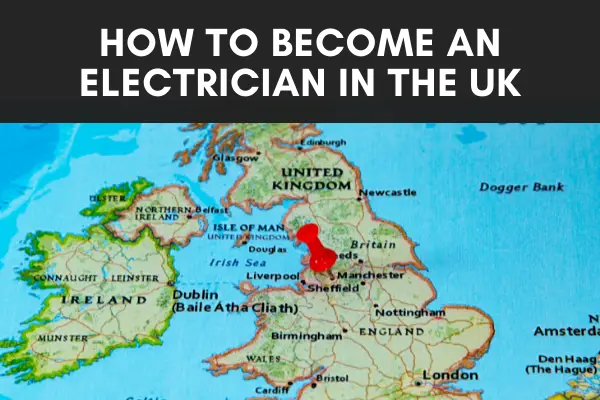If you’re considering moving to the UK or are already there and looking for a new career, you may want to consider becoming an electrician. There are over 41,000 electricians in the UK and many earn an average of £32,800 ($42,650) per year.
To become an electrician in England/UK, you’ll need to complete an apprenticeship program that lasts between 2 and 4 years. Alternatively, you may choose to become an electrician through courses, experience, or another combination of the two. Overall, apprenticeships are the best way to gain the knowledge and training you need to work independently as a qualified electrician in the UK.
Becoming a UK Electrician Through Apprenticeship
There are two main types of electrician apprenticeships in the UK: the standard installation and maintenance electrician advanced apprenticeship and electrician apprenticeships through the army or Royal Air Force.
Installation and maintenance electrician apprenticeships combine practical job training with study. You’ll spend a smaller portion of your week in a classroom setting and the rest of the time working under experienced electricians. The classroom setting will provide you with the NVQ qualification that recognizes your competency in the electrical field.
Apprenticeships allow you to gain job-specific skills and know-how alongside formal education, all while also getting paid.
To become an electrician apprentice, you’ll need to:
- Be at least 16 years old
- Meet the basic requirements for Level 2 apprenticeships, outlined below
- Find and apply for an apprenticeship online via the government portal
- Not be enrolled in full-time education when the apprenticeship program starts
Apprenticeship Levels and Requirements
There are 4 levels of apprenticeship, listed below. Your level will depend on the education you have completed.
- Intermediate (level 2)
- Advanced (level 3)
- Higher (levels 4, 5, 6, and 7)
- Degree (levels 6 and 7)
Apprenticeships can last anywhere from 1-4 years, with 2-4 years being the most common duration. The lower the level of apprenticeship, the longer it is.
Intermediate electrician apprenticeships are called Level 2 apprenticeships. This is the entry-level apprenticeship. It requires you to have at least 5 GCSEs graded between a 4-9, which is roughly an A-C in the American grading system. Of these 5, two must be for English and math.
GCSEs are General Certificates of Secondary Education. They are given per subject after a high school student has studied that subject for at least two years and passed the appropriate test. Generally speaking, passing at least 5 GCSEs would be equivalent to a U.S. high school diploma, but you’ll need to speak with your specific program to ensure they accept this exchange.
Many students meet the GCSE requirement by the time they are 16, when they may begin their Level 2 apprenticeship.
Advanced apprenticeships require A-level education. A-levels are a UK subject-based qualification for those 16 years and older. These tests are similar to the SATs in the U.S., as they’re used for entrance to universities.
Higher-level apprenticeships require a foundational degree and above. Foundational degrees in the UK are equal to two-thirds of a bachelor’s degree. These degrees are 2 years long and focus on a particular job or set of technical skills.
Finally, degree-level apprenticeships will require you to hold your bachelor’s or master’s degree.
If you don’t meet the requirements for the levels listed above, you might still be able to apply for an electrician apprenticeship. For a list of alternative qualification levels and requirements, see here.
Traineeships
If you’re 16 years or older but don’t feel ready to take on an apprenticeship, you can also begin your electrician’s career through a traineeship. Traineeships will help you with your CV, find a job, and gain the skills necessary for an apprenticeship.
Traineeships can last anywhere from 6 weeks to one year, although most are only a few months long.
Finding an Electrician Apprenticeship
Once you meet the requirements to begin an electrician apprenticeship program, you’ll need to search for apprenticeships online.
In England, you’ll create an account here and use the official government platform to search for apprenticeship opportunities in your area. There are separate pages for apprenticeships in Scotland, Northern Ireland, and Wales.
Once you find an apprenticeship that interests you, follow the directions and apply.
For tips on the application process and interviews, see here. If you apply and are not selected for an interview, reach out to the Apprenticeship Helpline by phone at 0800 015 0400 or by email at nationalhelpdesk@apprenticeships.gov.uk for further guidance.
Becoming a UK Electrician Through Courses
Some electricians may choose to learn the trade through electrician courses. These courses can be done in the evenings, on weekdays, or even intensively over a few short weeks. They are classroom-only, which means you won’t be working in the field as an apprentice would.
One example of an electrician’s course is the domestic installer course. This course is about one month long and will qualify you to complete residential jobs, like installing lights or rewiring a house.
Other courses include getting your Level 2 diploma in electrical installation or Level 3 diploma in electrical engineering.
While these courses and degrees may qualify you for smaller electrical tasks, taking courses without experience will not make you a fully qualified electrician. After coursework, it is highly recommended that you take on an apprenticeship or traineeship to receive supervised experience in the field before trying it out on your own.
Becoming a UK Electrician Through Experience
Some individuals may feel confident enough to reach out to an electrician and ask them to work as their helper or assistance. Generally speaking, at least one full year of work experience under the correct supervision is required for a new electrician to get their bearings. This is another way to learn through experience with the correct supervision, but it may be difficult to find an electrician willing to take on someone with no experience.
You may be able to learn enough through experience to feel confident as an independent electrician; however, a combination of work and formal education is always preferred as the safest route to becoming a qualified electrician in the UK.

